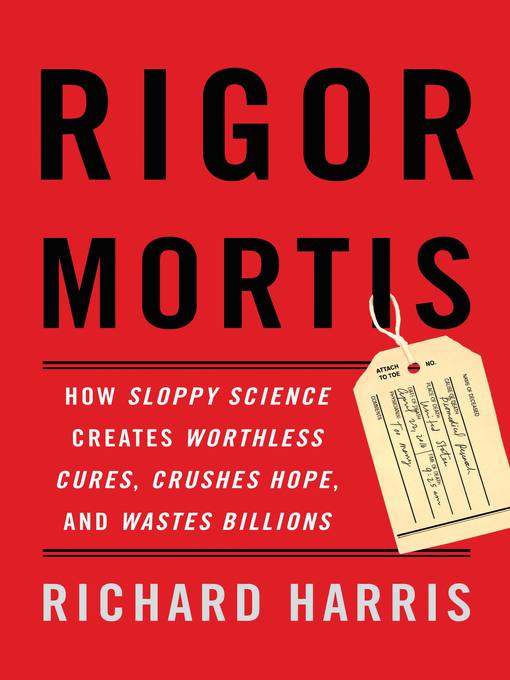
Rigor Mortis
How Sloppy Science Creates Worthless Cures, Crushes Hope, and Wastes Billions
- اطلاعات
- نقد و بررسی
- دیدگاه کاربران
نقد و بررسی

February 15, 2017
An award-winning science journalist reports that research in the biomedical sciences is too often guilty of wasting time and money and, worse than that, actually slowing scientific progress and misinforming the public.Harris, who has been reporting on science for NPR for 30 years, talked with dozens of scientists in preparing this report on the lack of rigor in biomedical science. Among his sources are C. Glenn Begley, whose study of experiments in cancer research revealed that barely 1 in 10 was reproducible, and John Ioannidis, whose paper, "Why Most Published Scientific Research Findings Are False," exposed problems caused by poor study design and analysis. Harris considers specific problems such as the failure to run proper controls, contamination of cell lines, bad antibodies, untrustworthy biomarkers, and small sample sizes; more importantly, he looks at the entire culture of biomedicine and finds it in serious need of repair. With numerous personality-rich examples and anecdotes, he describes what amounts to a rat race. The changes required are vast: the enormous pressure on researchers to obtain grants and publish, the emphasis that hiring universities place on the quantity rather than the quality of publications, the selection and review practices of science journals--he cites several high-impact ones, such as Cell, Nature, and Science--the reluctance of researchers to share data, their lack of a firm grounding in statistics, and their tendencies to select easy projects, cut corners, get results out fast, and hype results. In the final chapter, Harris examines the progress that is being made in fixing the system. One development is the increasing use of social media, which is enabling scientists to communicate more smoothly and blog about each other's research. The author's easy-reading but hard-hitting expose of a dysfunctional biomedical research system will inform and alarm general readers, and it is sure to stir controversy and arouse ire among those who feel their ox is being gored.
COPYRIGHT(2017) Kirkus Reviews, ALL RIGHTS RESERVED.

Starred review from April 1, 2017
Science journalist Harris investigates the research on research as he explores the highly competitive field of medical science. The author interviews scientists, doctors, patients, and administrators, covering the pitfalls that lead to faulty conclusions and retracted papers. Numerous studies have established that mistakes often come from issues with experimental design, comparison groups, randomization, and contamination. Seemingly small differences in methods and specimens can lead to invalid findings that cost millions and delay future studies. This book provides detailed insight into how scientific research is currently conducted, including how new drugs are discovered and tested and how diseases are studied. The author discusses possible improvements such as increasing transparency, data sharing, strengthening peer review, altering tenure requirements, and creating new funding structures. VERDICT This behind-the-scenes look at biomedical research will appeal to students and academics. A larger audience of impacted patients and taxpayers will also find this critical review fascinating and alarming. Highly recommended for public and academic libraries.--Catherine Lantz, Univ. of Illinois at Chicago Lib.
Copyright 2017 Library Journal, LLC Used with permission.




دیدگاه کاربران